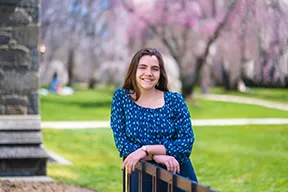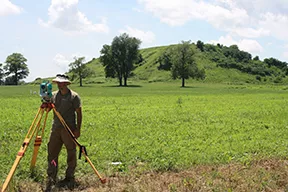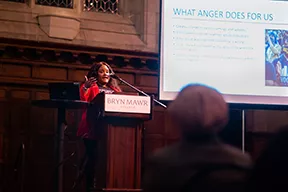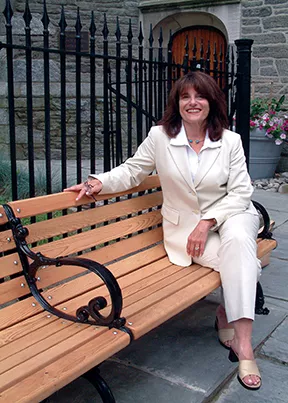For Starters: Spring 2023
A New Education Major, Electric Vans, Mapping Cahokia, and more.
2. Prepped and Ready to Go
“I feel prepared for this fellowship because of the internships I have done while at Bryn Mawr, including my work with the Haverford
Center for Peace and Global Citizenship and my research fellowship at the American Bar Foundation in Chicago. I’m grateful to Bryn Mawr for the many excellent classes I’ve been able to take on international relations, for the opportunity to be published in the Tri-Co Law Review, and for the perspective and confidence that Bryn Mawr and my professors here have given me.” —Charlotte McDermott ’23, the first Bryn Mawr student to be named a James C. Gaither Junior Fellow by the Carnegie Endowment for International Peace
3. 100% Electric
As part of campus efforts to lessen the College’s carbon footprint, Facilities Services
recently purchased two fully electric cargo vans. Electric vehicle technology has come such a long way, says Harold Maryea, facilities services director, that he had no hesitation adding the
battery-powered vans to his fleet. “They seemed like a great fit for our mostly on-campus needs,” says Maryea, “especially since we’re not having to travel long distances.”
The vehicles, Ford E-Transit 350 cargo vans, which are assigned to the lock shop and HVAC, can be plugged into a regular 110-volt outlet, and an onboard app lets the driver know how much charge is remaining. An electric Blue Bus is also on order and will be plying its route between Bryn Mawr and Haverford later on this year.
4. Mapping Cahokia
Associate Professor of Anthropology Casey Barrier and colleagues have received a five-year, $312,000 grant from the National Science Foundation to conduct the largest archaeo-geophysical project to date in all the Americas.
Barrier and his colleagues will use advanced magnetometry equipment to develop the most comprehensive map ever of the city of Cahokia, located in modern-day Illinois across the Mississippi River from St. Louis, Missouri. For this project they will focus on an area of approximately 5.5 square kilometers centered on “downtown Cahokia” that was home to as many as 10,000 to 15,000 residents during a period of rapid growth in the 10th and 11th centuries CE.
“You can think of it as an X-ray image of what’s preserved under the surface,” says Barrier of the research. “So, in terms of preservation of the site, we won’t put a shovel or a trowel into the ground. Yet, the research will provide important information about how humans organized themselves in early cities. And Cahokia is one of a handful of places across the globe where humans initiated urban life without direct contact with other urban societies.”
5. Seeing Red
“Anger creates change in various settings and systems. A lot of the laws, a lot of the policies, a lot of the changes in the world come
from anger. Someone saw that something in the world was wrong, and they fought day and night to make a change.” —Patrice N. Douglas,
BMC Keynote Speaker for Black History Month, whose talk, “Why I Am Not Allowed to See the Color Red,” was received by a
SRO crowd at Great Hall on February 28.
6. On the EDGE
Twenty-five years ago, Professor Emeritus Rhonda Hughes made math history by launching the EDGE (Enhancing Diversity in Graduate Education) program, which prepares women and minority students for graduate-level mathematics. The program, which has won numerous national awards, has been markedly successful in increasing the number of students from underrepresented groups and women earning Ph.D.s and going on to careers in academia.
This fall, to honor a quarter century of EDGE, a conference called Mobilizing the Power of Diversity will take place on campus (October 12–14). Noted speakers from academia, law, business, and industry will speak at the two-day event, including MacArthur Fellows Angela Duckworth and Ingrid Daubechies, who will speak on art history and the uses of mathematics in analyzing works of art. Jamie Fiore Higgins ’98 will speak about her best-selling book Bully Market and hold a book-signing.
Find out more and register at edgeforwomen.org/edge25/
7, It’s (a) Major
After more than 30 years of offering secondary teacher certification through the Bryn Mawr/Haverford Education Program (and a minor in education studies since 1998), the College now offers students here and at Haverford the option to major in Education Studies.
“There was a time when people could only imagine that you would study education if you were planning to become a classroom teacher,” says Alice Lesnick, term professor and director of the Bryn Mawr/Haverford Education Department. “And that’s a good reason to study; we have a large, wonderful group of students and alums who are classroom-based or school-based educators. But, of course, education is an academic field that people do a whole lot of things with and from. … Any of us who do professional work of any kind end up in teaching and learning and mentoring relationships. A lot of students are interested in being part of organizations and institutions that make change, broaden access, increase representation, or change unfair structures. All of those efforts involve education.”
Published on: 06/02/2023




